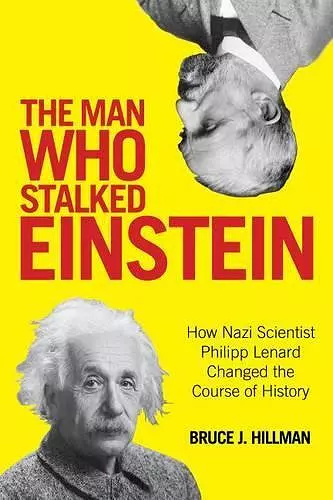The Man Who Stalked Einstein
How Nazi Scientist Philipp Lenard Changed the Course of History
Bernd C Wagner author Birgit Ertl-Wagner author Bruce J Hillman author
Format:Hardback
Publisher:Rowman & Littlefield
Published:14th Jun '15
Currently unavailable, our supplier has not provided us a restock date

A gripping account of the rivalry between Albert Einstein and Philipp Lenard, detailing their conflict's profound impact on science and society. The Man Who Stalked Einstein reveals this fascinating story.
In The Man Who Stalked Einstein, the narrative unfolds around the intense rivalry between Albert Einstein and Philipp Lenard, a prominent physicist aligned with the Nazi regime. By the conclusion of World War I, Einstein had emerged as a leading figure in theoretical physics, attracting admiration and animosity alike. Lenard, a Nobel Prize winner, dedicated his career to undermining Einstein's reputation, driven by a combination of professional jealousy and ideological fervor. Their contentious relationship serves as a focal point for exploring broader themes of science, politics, and identity during a tumultuous historical period.
The conflict between these two scientists is not merely a personal vendetta; it reflects the larger societal tensions of their time. With Einstein representing the progressive and inclusive ideals of science, while Lenard epitomized the exclusionary and nationalist sentiments that would later gain traction in Nazi Germany, their story encapsulates a pivotal moment in the history of science. The book delves into how their rivalry influenced the scientific community and the trajectory of physics, particularly in the context of the rise of fascism.
As Einstein fled to America, seeking refuge from the oppressive political climate in Germany, the implications of their conflict extended beyond their individual lives. The Man Who Stalked Einstein illustrates how their antagonism shaped the landscape of science and the lives of countless individuals, leaving a legacy that resonates even today. This exploration of their interactions provides a compelling look at the intersection of personal ambition, scientific discovery, and the sociopolitical forces at play during the early 20th century.
In this title, the differences between theoretical and experimental physics are embodied respectively by Einstein and Philipp Lenard, a virulently anti-Semitic German physicist who won the Nobel Prize for Physics in 1905. Hillman describes how, unable to prove the existence of the long-popular notion of 'ether,' in debt, and jealous of the attention paid Einstein, Lenard abandoned his early admiration of the younger man and escalated his ad hominem attacks on his fellow Nobel winner for more than 20 years. The book relies in part on original works in German, thanks to Birgit Ertl-Wagner and Bernd C. Wagner’s translations for Hillman, adding a new perspective to the study of Einstein. It includes fascinating biographical information on both men. . . .Hillman has succeeded in his goal to 'write a history…that read(s) like a novel,' opening at the scene of a Nazi book burning. This very accessible popular science book will engage readers interested in physics, World War II, history, and biography. * Library Journal *
In 1905 Albert Einstein, then a relatively unknown German theoretical physicist, published the paper that introduced his theory of relativity; that same year Philipp Lenard, an older and well-respected experimental physicist, won the Nobel Prize. Einstein, of course, went on to iconic status, but outside the scientific community, Lenard is pretty much unknown these days. What happened? In simple terms, hatred, paranoia, and bigotry are what happened. This is a portrait of a man of indisputable talents who allowed himself to become obsessed with bringing down another brilliant man, who, Lenard believed, was passing off wild speculation as science. But this was more than professional rivalry; Einstein was Jewish, and Lenard was an anti-Semite who would become one of Hitler’s advisors. Was Lenard’s campaign part of a larger effort to rid the scientific community of Jews? Evidence suggests so, though this account also suggests that Lenard seemed honestly to believe in a conspiracy to deprive him of credit for discoveries made by other scientists. A deeply fascinating, deeply sad book that will be appeal to anyone with an interest in the history of modern science. * Booklist *
ISBN: 9781493010011
Dimensions: 235mm x 160mm x 21mm
Weight: 25g
228 pages